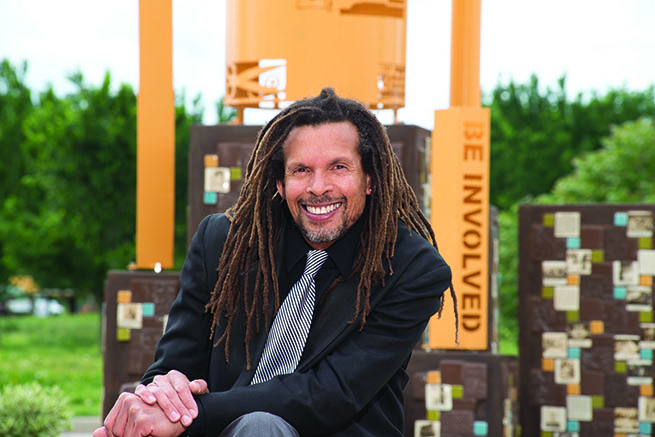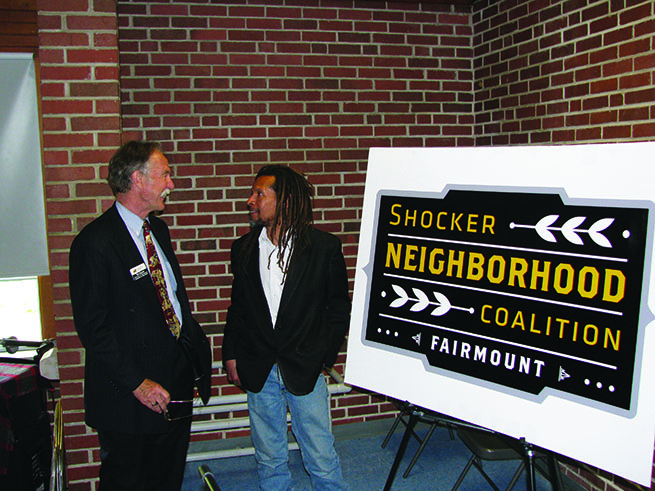
Darryl Carrington ended up as a Wichita resident quite by accident.
In the summer of 2005, he, his wife Cassandra and son Oases were passing through on their way to Charleston, S.C., after deciding to move from California. In Wichita, it
was discovered that Cassandra needed emergency surgery.
“In the process of her healing, we got involved with Fairmount United Church of Christ,” Carrington says of the church that has stood on the southwest corner of Fairmount and 16th Street for more than a century.
The family soon decided not to finish that trip to Charleston, and instead took up residence in the Fairmount neighborhood, where Carrington was asked by the church to be a mentor for area youth. He subsequently began serving in the neighborhood with AmeriCorps, an organization that engages in intensive service at nonprofits, schools and public agencies across the country.
In 2008, after two years with AmeriCorps — and after receiving encouragement from fellow churchgoers including organist Celia Goering ’63 — Carrington applied for several jobs at WSU. A year into his job as a plumber, he enrolled as a student and has been diligently taking a few classes each semester since then.
“As a returning adult student around 50 years old,” he says, “the Educational Opportunity Center’s program was a great resource.” He plans to graduate from WSU with a bachelor’s degree in health management and community development in May 2017.
When he first started working at Wichita State, he spent quite a bit of time attending to the needs of residence hall plumbing. “Once I left the dorms,
I became a service plumber,” he says of the position that sometimes required him to crawl into small, dark spaces to take care of the most menial tasks.
“I lived down the street, so they would call me any time of the day or night. That was my role, to be a servant’s servant. I got to know every inch of this university.”
It was, ironically enough, a dark space — though this one was not as cramped as some he experienced — that was the catalyst for another unexpected event. “I was coming out of the darkroom in McKnight, where I was fixing plumbing, and literally ran into Dr. Bardo,”
Carrington reports. “He says, ‘Hi, I’m your new president.’ And I say, ‘Hi, I’m your plumber.’”
After taking a few steps back and letting his eyes adjust to the light, he decided to make the most of his opportunity to talk with Bardo, who arrived on campus as the university’s 13th president in July 2012.
The previous year had seen around a dozen students robbed within a half-mile radius of campus, and the most recent incident involving an armed assailant occupied a prominent place in Carrington’s memory.
“The Sunflower picked it up, and students gave the neighborhood two thumbs down,” he says of a survey conducted by the campus newspaper. “I live in that neighborhood. It was the worst thing to have that consensus. When I ran into him, I had that on my mind. I told him, ‘We need to build bridges.’ That’s been our connection ever since, and the relationship has been marvelous.”
These days, building bridges between the university community and the neighborhood to its south is part of Carrington’s job description. No longer working as a plumber, he has been the Hugo Wall School of Public Affairs’ community liaison for nearly a year.
“The community sees me as a resource,” he says. “People are in my office all the time with ideas.” Although he isn’t able to say yes to every proposal, he appreciates the initiative shown by those who come to see him.

Opportunity, and Darryl Carrington attend a May 2 Kansas Health
Foundation meeting at the Fairmount Park Community Center.
Carrington’s campus involvement extends beyond his role as a student and his position as community liaison.
He is an elected member of the Unclassified Professional Senate — which represents the interests of unclassified professional employees on campus — and is active in the Shocker Neighborhood Coalition.
That coalition is part of Wichita State’s Office of Community Engagement and Opportunity, headed by vice president and general counsel emeritus Ted Ayres and born out of the university’s Enough is Enough initiative.
The Enough is Enough Task Force was formed by Bardo in December 2014 as a response to assaults and other crimes, including a fatal attack on Letitia Davis, that occurred in the neighborhood.
When Carrington learned of the violent circumstances surrounding Davis’ death, he was horrified, saddened and, because of ongoing work to make the neighborhood safer, greatly disheartened.
“This set us back to the Stone Age,” he says. “This is not conducive to where we want to go.”
Where Carrington, Bardo, Ayres and other neighborhood stakeholders want to go is toward improved safety and a higher quality of life. Thanks to a $250,000 Community Engagement Initiative grant from the Kansas Health Foundation, the coalition is moving forward in pursuit of these goals.
A host of events, including Take Back the Night walks, a spring barbecue sponsored by the Office of International Education and a statewide summit of KHF grant recipients, has been held at Fairmount Park. Additionally, construction crews are in the process of installing tennis courts at the park, which might also become a Wi-Fi hotspot.
“We’re talking about it,” says Carrington, who wants to see the park become a go-to gathering place for Fairmount’s residents.
As one of those residents, Carrington tries to greet both the triumphs and the challenges of his neighborhood with optimism. “I wear rose-colored glasses,” he says. “I’m the happiest guy ever.”
And he’s fully committed to the community he adopted. Although he was born in Charleston and grew up in Compton, Calif. (where his father retired as the police chief), Carrington, along with Cassandra, Oases and daughter Mirage, who was born after the family settled in Wichita, has put down roots.
“I love Charleston, but Fairmount is our home,” he says. “The university, the neighborhood, the church community — I’m interwoven in all of those. I’m very fortunate.”
Carrington appreciates guidance he has received from, among others, George Platt, WSU associate professor emeritus of public administration, who has served as a mentor to him. He also enjoys learning as much neighborhood and university history as he can.
No matter where he looks, he finds the connection between the two is strong.
“When I’m in the choir loft and look east, I see the Sower of Seeds,” he says of a stained glass window in the Fairmount United Church of Christ’s sanctuary that is dedicated to William Henry Isley, the first dean of Fairmount College. “And I think, that’s me in Fairmount. We’ve been sowing seeds. That’s what I do.”
Those seeds of civic engagement and a strong emphasis on education are showing signs of generating positive change, thanks to Carrington and others in this coalition of neighbors.





